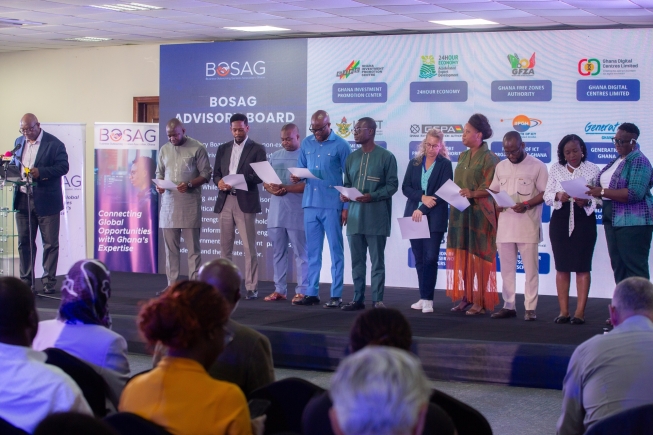Ghana has taken a decisive step toward positioning itself as a leading global business services hub with the launch of the Business Outsourcing Services Association Ghana (BOSAG) Five-Year Strategic Plan.
The event, held at the Accra Digital Centre, set an ambitious national target of creating 100,000 sustainable international-facing jobs for young people by 2030.
The initiative marks a major milestone for an industry that began as a modest vision shared by a small group of BPO and ITO leaders. Reflecting on this evolution, David Gowu, CEO of BOSAG and a founding board member, said the transformation had been remarkable. “Three years ago, we asked ourselves how Ghana could compete globally in outsourcing and digital services. Today, that vision has become a reality. It is humbling to see this plan come to life—a roadmap that will transform Ghana’s digital economy and create opportunities for thousands of young people.”
The five-year strategy aims to establish Ghana as a premier global destination for outsourced services, leveraging its competitive labour force, expanding digital infrastructure and favourable geographic location. Central to this plan are five key pillars focused on improving international visibility, enhancing skills development, building sector capacity, driving policy advocacy and advancing research and knowledge sharing.
Government has thrown its full support behind the initiative. Delivering a statement on behalf of the Chief of Staff, Shamima Muslim described the plan as a timely blueprint to expand economic opportunities. She said, “BOSAG’s strategic plan builds on Ghana’s digital transformation legacy. It presents a bold and coordinated roadmap to unlock 100,000 sustainable international-facing jobs for Ghanaian youth by 2030. This is not just a number—it is a promise to our young people, a commitment to inclusive growth, and a strategy to harness the full potential of our digital infrastructure, our competitive workforce, and our strategic location.”
Representing the Minister of Communication, Digital Technology and Innovations, Bishop Dr Samuel Antwi-Gyekyi outlined broader government efforts to build an investor-ready digital economy. He announced partnerships with global technology companies including Huawei, MTN, Amazon Web Services and Oracle to promote specialised training programmes. He added that legislation such as the Ghana Startup Act, new cybersecurity regulations and frameworks for artificial intelligence and digital trade were nearing completion to strengthen the regulatory environment.
The event drew government officials, development partners, international outsourcing specialists and private sector leaders. BOSAG Board Chair Kojo Hayford emphasised the importance of collaboration in driving growth across the sector. International experts David Rumble from the United Kingdom and Rolana Rashwan from Egypt shared global best practices, reinforcing Ghana’s readiness to compete internationally.
Senior executives from global BPO giants Concentrix and Teleperformance also participated, including Ryan Keilloh and El Hadi Ouadghiri Bencherif. They engaged in strategic discussions on what Ghana must prioritise to meet the 100,000-job target, including stronger cooperation between global and local actors.
Development organisations played a crucial role in the initiative’s rollout. GIZ Ghana, through its Invest for Jobs Programme, supported the formulation of the strategic plan, while Ghana Digital Centres Limited hosted the launch. Its CEO, Dzifa Gunu, underscored the need for expanded digital infrastructure and nationwide training centres to sustain industry growth.
The programme also showcased Ghana’s growing pool of technology talent. MEST Africa conducted a live demonstration of the newly redesigned BOSAG website, while young developers from the Mastercard Foundation-sponsored GROW programme exhibited innovative applications. A demonstration by the 4th-IR team highlighted the central role of artificial intelligence in boosting Ghana’s competitiveness in global business services.
A key highlight of the ceremony was the swearing-in of the BOSAG Governing Council, tasked with providing strategic direction and ensuring alignment with national development priorities. Council members include Kojo Hayford, David Gowu, Matthew Darkwa, Rolana Rashwan, Deborah Asmah, Mavis Ampah and Ryan Keilloh.
BOSAG also inaugurated an Advisory Board to provide expert guidance and strengthen stakeholder collaboration. Organisations represented include the Ghana Investment Promotion Centre, 24-Hour Economy Secretariat, Ghana Free Zones Authority, Ghana Digital Centres Limited, Kwame Nkrumah University of Science and Technology, Ghana Export Promotion Authority, Institute of ICT Professionals Ghana, Generation Ghana, Soronko Academy and the Tony Blair Institute for Global Change, among others.
Looking ahead, BOSAG has called for deeper collaboration across government, the private sector, academia and global investors to ensure Ghana realises its aspiration of becoming one of Africa’s leading outsourcing destinations. The Association believes that with the right investment climate, training programmes and policy reforms, the country is well placed to deliver the promised 100,000 jobs and shape a vibrant digital economy.
